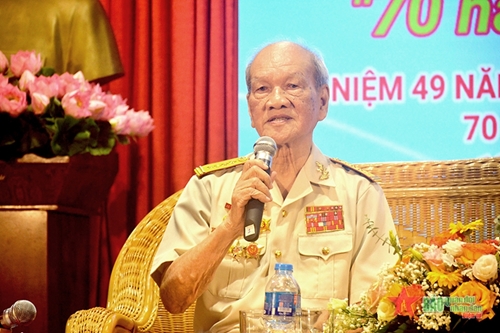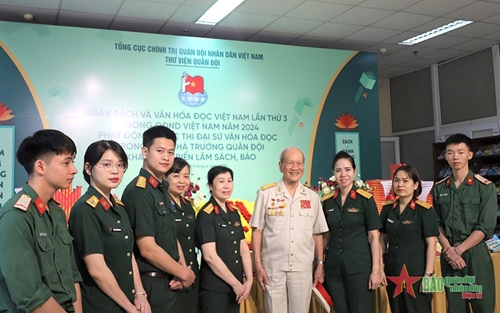Former Director of the Department of Military Training of the General Staff and former Political Officer of Regiment 209 under Division 312 Senior Colonel Nguyen Huu Tai said that at an exchange and seminar, titled “70 years - Forever resounding epic of Dien Bien,” recently held by the Military Library.
    |
 |
|
Sr. Col. Nguyen Huu Tai shares his memories of the campaign at the event. |
Col. Tai affirmed that political work made a significant contribution to the Dien Bien Phu Victory. Art troupes formed a special corps and were ready to sing songs and read poems in trenches and artillery emplacements. Leaflets distributed deep into the enemy’s central area had a strong influence on the enemy soldiers' mindset. Copies of the People's Army Newspaper conveying the leadership's directives and developments on the battlefield became indispensable mental pabulum for officers and soldiers.
In previous campaigns, each unit participated in a few battles, which normally lasted no more than one night, and after the battle, our troops immediately withdrew to safe positions in the rear to rest and make preparations for the next battle. However, in the Dien Bien Phu Campaign, the fighting lasted longer. Long-range ambushes, defensive battles, and fierce counter-attacks continuously took place. After each combat, troops immediately started building fortifications and trenches. Officers and soldiers ate and slept right in fortifications. The intensity of the fighting was extremely high, exceeding human endurance.
    |
 |
|
Sr. Col. Nguyen Huu Tai (fourth from the right) join an exchange held by the Military Library on the occasion of the Vietnam Book and Reading Culture. |
The former officer recalled that at the end of phase 1 and the beginning of phase 2, apart from courageous, resourceful, and creative examples, some soldiers were fearful of hardships and did not strictly obey orders. In response to the situation, in late April 1954, a conference was convened to check the thoughts of party secretaries of divisions, representatives of general departments, and those with the highest responsibilities before the campaign. Col. Tai recalled that the meeting took place at a thatched-roof house at the Muong Phang command post. Since most of the participants knew each other, we took the opportunity to exchange experience in conducting battles or discuss methods to overcome difficulties to achieve new victories.
The following day, the conclusions of the conference were disseminated as study material. Political officers from various units were assigned to support the implementation of an intensive education program for the entire military, party committees to party members, from officers to soldiers, to enhance their awareness of the situation and strengthen their determination to fulfill their tasks. “Each officer and soldier self-assessed their responsibilities, was determined to make extraordinary efforts, avoiding complacency, arrogance, confusion, or hesitation. As a result, a new spirit was formed and spread widely after the program. This was considered one of the military’s great successes of the political work on the Dien Bien Phu Theater,” affirmed Col. Tai.
Translated by Tran Hoai